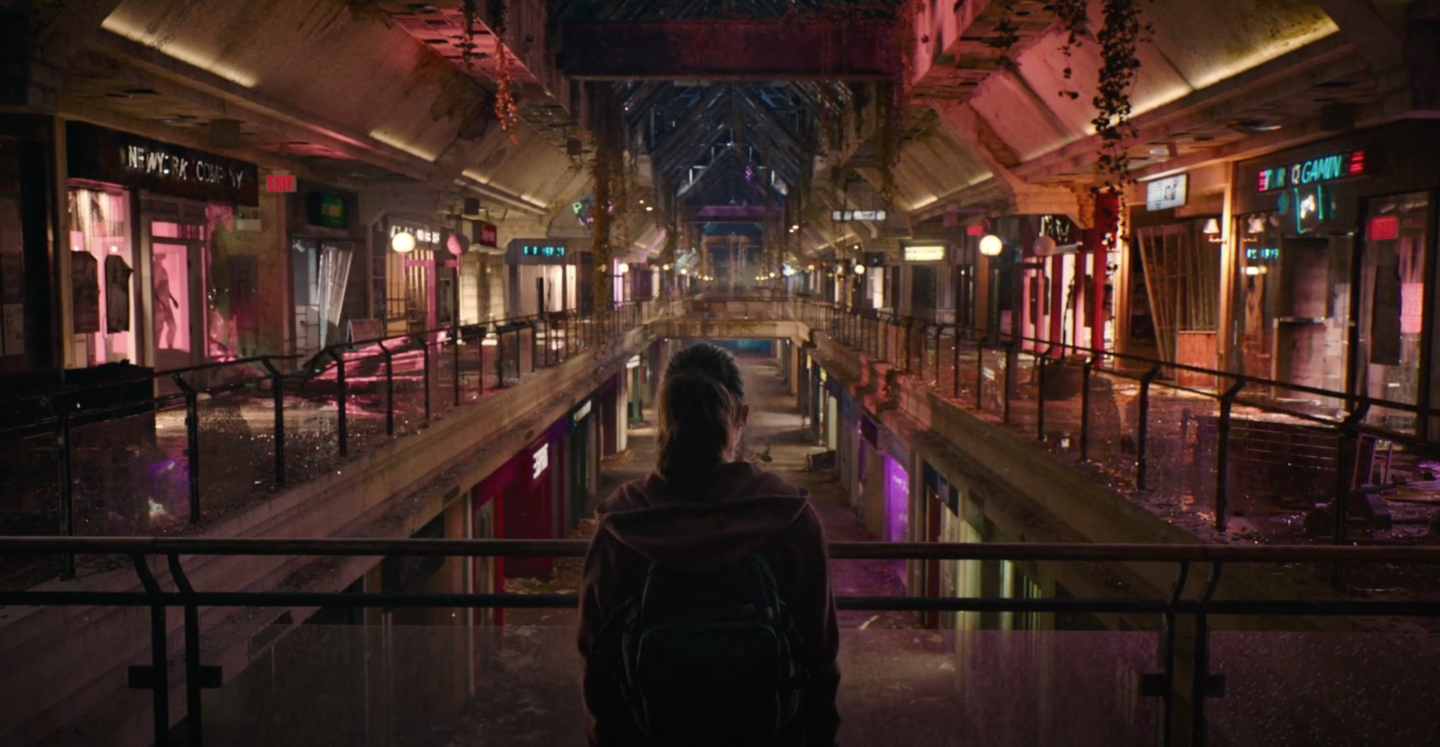In episode seven of The Last of Us, “Left Behind,” Ellie (Bella Ramsey) is taken on a late-night expedition to see a relic and wonder of the past: the mall. Even in “non-post-apocalyptic” (so we tell ourselves) America, said milieu has become something of a relic, regardless of remaining a “novelty” to those who didn’t grow up with it as the end all, be all of hangout locations (see: Billie Eilish in the video for “Therefore I Am”). To Ellie, taken there by Riley Abel (Storm Reid), her best friend and former roommate at the FEDRA military school, it is just such a novelty.
Although Ellie is initially reluctant to accompany her bestie on this mysterious nocturnal journey, Riley soon makes good on her promise of it being “the best night” of Ellie’s life. Which, yes, is a testament to how bleak things have gotten. After the two sneak into the complex where the endless slew of shops is housed, Riley sets up the majesty for a first-time viewer of the mall by telling Ellie to go ahead of her and call out once she’s gone through the hallway and turned right. When Ellie announces, “I’m here, now what?,” Riley turns every light on in the place to reveal the beautiful embodiment of capitalism in all its decayed glory.
Ellie, usually unimpressed by just about everything, stares out at the commercial abyss in stunned wonder. A classic case of being glamored by the bells and whistles of capitalism. Almost like an Eastern bloc defector in the Cold War creeping into America to see what all the fuss is about. To paraphrase what Ruben Östlund said during most of his interviews promoting Triangle of Sadness, “Capitalism won over communism during the Cold War because it was sexier.” In short, Reagan had the snappier quotes (e.g., “Socialism only works in two places: heaven where they don’t need it and hell where they already have it”). And, talking of quotes, one thing Östlund actually did say during an interview was, “Capitalism is so good at exploiting all our needs and all our fears, where we live, our food, and makes money out of our creativity and everything we do.” In other words, it knows how to seduce better than Peitho.
Watching Ellie unwittingly absorb capitalism’s neon seduction without appearing to be aware of or understand its detriments makes it all the more facile for her to become enamored of “the way it used to be.” That is to say, before the overrunning of the Earth by fungally-controlled zombies. And, as Riley assures her, “You ain’t seen nothin’ yet,” we can see that’s very true when Ellie is additionally wowed by the mere presence of a working escalator. Although Riley had only planned on billing four aspects of the mall as “wonders,” she chooses to call the escalator one as well, seeing how much it dazzles Ellie. The second is a merry-go-round, the third is a photobooth (typically overpriced at five dollars) and the fourth is the arcade—particularly meta seeing as how The Last of Us is based on a video game. But the game referenced in this episode is Mortal Kombat II, which Ellie has a poster of in her room at military school.
When Riley confesses that she’s leaving Boston that night for good (stationed elsewhere by the Fireflies she’s joined up with), Ellie, in her state of sadness and rage, nearly opts out of the fourth-turned-fifth wonder of the mall: the Halloween costume shop. Unable to repress her lovelorn feelings, she goes back into the bowels of the mall when she hears a scream she assumes is coming from Riley, only to find it’s a sound effect of one of the props in the costume shop. The two then proceed to find love in a hopeless place, as they both give in to the romance that only capitalism can furnish, even in its “dormancy.” Kissing each other after Etta James’ “I Got You Babe” ends, one might say it was all the proverbial “wining and dining” Riley did that got Ellie to finally surrender to her true feelings. For, even in the post-apocalypse, girls just wanna be shown you care through material things (like volume two of a pun book).
Which is perhaps why the most depressing aspect of “Left Behind” isn’t that Ellie and Riley will not have a happy ending after at last admitting their affection for one another, but that the allure of the mall (and all it represents), in spite of being theoretically defunct after an apocalypse, will not die. Its metaphor lives on (for you can’t kill an idea, etc.). This ultimate emblem of consumer culture can still manage to hypnotize and seduce people. Even if it’s a person who doesn’t know any better about the effects of capitalism—you know, the ones that ultimately lead to things like the level of global warming that can cause a fungal infection to adapt to body temperatures and become hospitable in humans, thereby creating the post-apocalyptic state in The Last of Us in the first place. That a ravenous zombie ends up attacking them in the final scenes feels only too poignant as well, considering that ravenous zombies were (and are) the primary clientele of the mall in its heyday.
Leading one to ask, from within the context of the show: was it really “better” then, when places like the mall functioned to make us all feel as though we were “civilized” members of a “society”? Or should the one benefit of a post-apocalypse be that you don’t have to feel like you’re still constantly being brainwashed to “want” useless things (like, as Ellie and Riley point out, lingerie)? Then again, considering Ellie still has to do pre-apocalypse shit like PE, it seems unclear what, exactly, is meant to truly differentiate our current climate of societally-imposed expectations and misplaced obsessions from a post-apocalyptic one.























[…] Genna Rivieccio Source link […]